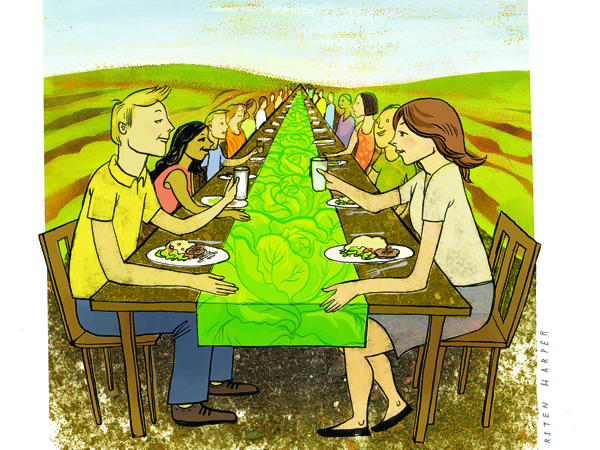 by Judy Wicks
by Judy Wicks
I had just turned six when my family moved to the small town where I grew up in western Pennsylvania. On the first day in my new community, I collected all the extension cords I could find and connected them down the driveway, where I set up my child-size dining table with two chairs, and plugged in a toy record player. Turning the volume up full-blast, I sat down at the table to see who might come along. At last, I spotted a neighborhood boy walking along the road, and gleefully watched as he stopped and turned up our driveway to take a seat at my table. Though I hadn’t any food to serve, he must have been my first restaurant customer!
No longer six, but sixty-something, I look back on a career of building community by gathering people around tables. At community tours and “Table Talk” programs held at the White Dog Cafe, customers have made many a new friend with mutual interests in a wide range of environment and social justice issues—building a solar house, reforming drug policy or saving our oceans. At a program on the lives of inner-city children, a customer once asked why there were few swings in playgrounds. And the Philadelphia Swing Project was born, with many customers joining in to raise money and install swings.
Suppliers, too, are part of the White Dog community—farmers, cheesemakers, bakers, brewers. When I first got my liquor license, I decided to carry only local beer. Twenty-five years ago, that was a novel idea, and I had to search high and low to find local microbreweries. When I heard there was a new woman-owned brewery out in Lancaster County, I called up Carol Stoudt to place an order. She drove the beer into town with the keg riding next to her strapped in with the seatbelt!
Here in Philadelphia, a robust local living economy has taken root, giving our city unique character and hope for a sustainable future. We boast a growing number of farms, markets and local food enterprises, green builders, designers and salvagers, unique boutiques featuring locally-made, eco-friendly and vintage clothing. Knowing who bakes our bread, builds our cabinets, sews our clothes and brews our beer enriches our community. We go to farmers’ markets to buy fresh produce, but also because it’s fun to see our neighbors and meet the farmers who grow our food—to feel the sense of place and happiness that comes from vibrant community life.
People often ask me if I miss the White Dog, but I’ll tell you, I’m really enjoying transitioning from an entrepreneurial activist to a citizen activist, from the responsibility of running a business to the responsibility of being a conscious consumer at locally-owned, green businesses as much as possible! It’s exciting to see the next generation, many the grown children of longtime White Dog customers, starting green businesses and serving in local government and nonprofits that are putting Philadelphia on the map in sustainability. What has always been most important to me at the White Dog—being part of a community of shared values—continues to grow as though those extension cords of my childhood have multiplied into a far-reaching interconnected community. There’s a collective joy in working collaboratively toward a shared vision for a local living economy in Philadelphia—a sense well captured in these pages. Makes me want to crank up that little old record player and dance in the street!
Judy Wicks is co-founder of the international Business Alliance for Local Living Economies (BALLE), and founder of the Sustainable Business Network (SBN) and Fair Food in Philadelphia. She is best known as the founder of the White Dog Cafe, which she operated from 1983 to January 2009, and the Black Cat, which featured locally-made and fair trade products for 20 years. judywicks.com


